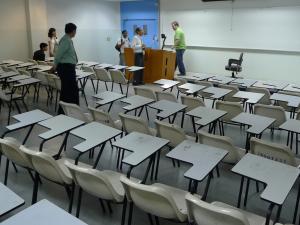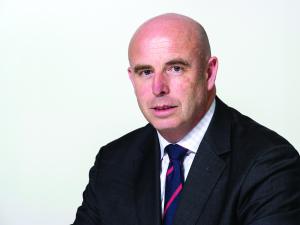Respiratory physician Lutz Beckert considers chronic obstructive pulmonary disease management, including the prevention of COPD, the importance of smoking cessation and pulmonary rehabilitation, and the lifesaving potential of addressing treatable traits. He also discusses the logic of inhaler therapy, moving from single therapy to dual and triple therapy when indicated, as well as other aspects of management
Kudos to colleagues: Connolly spreads the love, but doesn’t suffer fools
Kudos to colleagues: Connolly spreads the love, but doesn’t suffer fools

From the Archives: February 2019 The amicable but staunch leadership of Andrew Connolly comes to an end this month at the Medical Council, soon after a New Year Honour was bestowed. Virginia McMillan asks the busy 56-year-old to look back over the recent past
Doctors misdiagnosing their own health prematurely curtails more careers than the Medical Council does for other reasons
As his five-year term as Medical Council chair wound down this month, Auckland surgeon Andrew Connolly found plenty of positives to ponder.
Although he admits he doesn’t “suffer fools”, Mr Connolly seems to have found them thin on the ground.
He says council members and staff have been superb; he has also enjoyed working closely with people from clinical, academic, collegiate, bureaucratic and political spheres.
“That personal ability to get on the phone actually helps,” he adds.
He has long had a habit of speaking his mind but says he has learned to be a bit more diplomatic.
Still, “I’m not very good at being poker faced...and if someone is talking rubbish, I’ll say, ‘I’m sorry, I think that’s wrong.’”
Unanimity or close to it have been the norm around the council table; he has had to cast his vote to resolve an issue only three times.
He says he’s stoked to receive the honour of Member of the New Zealand Order of Merit, especially for wife Jen, daughter Kate and son Fergus, who have given up a huge amount to allow him to manage a large workload.
Mr Connolly also gives kudos to his medical colleagues nationwide.
“In my time as chair, I’m pretty certain we have only suspended one doctor purely for being utterly incompetent,” he says.
Just two doctors were struck off in 2016/17, the latest year reported by the council, out of 15,744 registered doctors.
Mr Connolly says GPs have “the profession’s most difficult job, because it’s so vast”.
In many areas, GPs also cope with isolation, antiquated IT and poor availability of secondary services, and some may not have had a holiday for two years, he says.
Bearing in mind this context, the fact there are some knowledge deficits is not surprising. “But there’s rarely a catastrophic absence of clinical knowledge.”
For many years as a doctor, Mr Connolly thought the council “took my money and told me off, and that was it”.
Far beyond registration fees and disciplinary matters, the council has over his nine years – the first four as a board member – traversed a lot of new ground in guidance and rules for doctors.
As he departed the chair’s seat at the council’s first meeting of the year yesterday (12 February), there would no doubt have been congratulations on his honour, for services to health.
It celebrates his 21 years as a colorectal surgeon at Middlemore Hospital, where he has been head of department of general and vascular surgery since 2003. He wonders whether some of his “fantastic” colleagues at Counties Manukau DHB nominated him.
The swathe of other contributions noted in his citation include: member of the ministerial task group on clinical leadership; chair of the ministerial review of the impact of the elective waiting times policy; honorary professorships at the University of Auckland; and author of 35 academic papers.
He expects to attend a couple more council meetings – “I’ll try not to be annoying down the back” – and to pass on the head of department baton soon. He’ll spend more time on strategy and planning for Counties Manukau DHB. He is, for example, lead clinician on the group planning the SuperClinic/surgery centre redevelopment.
There is a new role as Health Quality & Safety Commission board member, and he will continue on the partnership group for the new Dunedin Hospital.
It’s unlikely he will turn down appointments should they be offered by health minister David Clark or the Ministry of Health.
“I really enjoy the strategic side of the public health system.”
He has never worked in the private sector: “I passionately believe in the public health system.”
Mr Connolly hopes the council’s work during his time will leave the health sector better – at cultural competence, for example. “Trying to make that clinically real is an intellectual challenge,” he says, adding he is impressed by many colleges’ efforts in this area.
Change can be hard fought. “We had to tighten up significantly on prescribing [for self and family]...That has led to a fair bit of angst.”
The council reviewed international and New Zealand evidence. The conclusion? “Doctors trying to manage their own health is high risk for themselves, and trying to provide care for their near and dear is very high risk for their near and dear,” he says.
“Doctors misdiagnosing their own health prematurely curtails more careers than the Medical Council does for other reasons.”
Mr Connolly fronted up to criticism when the council introduced a new approach to continuing professional development – the much-maligned draft paper on “strengthening recertification”. GPs were prominent among those who spoke against the inference that older doctors would be targeted.
The council apologised for its wording; Mr Connolly says this was a gracious move after some unhelpful comments from people who had been “in the room”. The council was not proposing mandatory tests based on age.
“That work is still ongoing, and there will be no mandatory tests based on age.”
Formal continuing education for general registrants has been well received, he says. Similarly, community attachments for interns have prompted good feedback. He hopes it will fulfil its early promise and lead more new doctors into general practice
- He’s obsessed with military history.
- He co-wrote, while “mainly in the Air New Zealand Koru lounge”, a two-volume book about Auckland Grammar boys in World War I.
- He’s relieved not to have to lead any Medical Council contribution to the debate on legalising euthanasia.
- He got mediocre grades in his first three years at medical school.
- He can watch hours of test cricket and English football on TV.
- Apology or not, will GPs be reassured on older doctors’ requirements? - 10 May 2017
- Insulting to older doctors, say GPs of Medical Council’s education approach - 1 March 2017
Andrew Connolly recently started as chief medical officer at the Ministry of Health for the 2021 year. This profile of him has been republished from New Zealand Doctor/Rata Aotearoa in our free space so it can be shared more widely. Please think about supporting us – subscribe here







![Barbara Fountain, editor of New Zealand Doctor Rata Aotearoa, and Paul Hutchison, GP and senior medical clinician at Tāmaki Health [Image: Simon Maude]](/sites/default/files/styles/thumbnail_cropped_100/public/2025-03/Barbara%20Fountain%2C%20editor%20of%20New%20Zealand%20Doctor%20Rata%20Aotearoa%2C%20and%20Paul%20Hutchison%2C%20GP%20and%20senior%20medical%20clinician%20at%20T%C4%81maki%20Health%20CR%20Simon%20Maude.jpg?itok=-HbQ1EYA)
![Lori Peters, NP and advanced health improvement practitioner at Mahitahi Hauora, and Jasper Nacilla, NP at The Terrace Medical Centre in Wellington [Image: Simon Maude]](/sites/default/files/styles/thumbnail_cropped_100/public/2025-03/2.%20Lori%20Peters%2C%20NP%20and%20advanced%20HIP%20at%20Mahitahi%20Hauora%2C%20and%20Jasper%20Nacilla%2C%20NP%20at%20The%20Terrace%20Medical%20Centre%20in%20Wellington%20CR%20Simon%20Maude.jpg?itok=sUfbsSF1)
![Ministry of Social Development health and disability coordinator Liz Williams, regional health advisors Mary Mojel and Larah Takarangi, and health and disability coordinators Rebecca Staunton and Myint Than Htut [Image: Simon Maude]](/sites/default/files/styles/thumbnail_cropped_100/public/2025-03/3.%20Ministry%20of%20Social%20Development%27s%20Liz%20Williams%2C%20Mary%20Mojel%2C%20Larah%20Takarangi%2C%20Rebecca%20Staunton%20and%20Myint%20Than%20Htut%20CR%20Simon%20Maude.jpg?itok=9ceOujzC)
![Locum GP Helen Fisher, with Te Kuiti Medical Centre NP Bridget Woodney [Image: Simon Maude]](/sites/default/files/styles/thumbnail_cropped_100/public/2025-03/4.%20Locum%20GP%20Helen%20Fisher%2C%20with%20Te%20Kuiti%20Medical%20Centre%20NP%20Bridget%20Woodney%20CR%20Simon%20Maude.jpg?itok=TJeODetm)
![Ruby Faulkner, GPEP2, with David Small, GPEP3 from The Doctors Greenmeadows in Napier [Image: Simon Maude]](/sites/default/files/styles/thumbnail_cropped_100/public/2025-03/5.%20Ruby%20Faulkner%2C%20GPEP2%2C%20with%20David%20Small%2C%20GPEP3%20from%20The%20Doctors%20Greenmeadows%20in%20Napier%20CR%20Simon%20Maude.jpg?itok=B0u4wsIs)
![Rochelle Langton and Libby Thomas, marketing advisors at the Medical Protection Society [Image: Simon Maude]](/sites/default/files/styles/thumbnail_cropped_100/public/2025-03/6.%20Rochelle%20Langton%20and%20Libby%20Thomas%2C%20marketing%20advisors%20at%20the%20Medical%20Protection%20Society%20CR%20Simon%20Maude.jpg?itok=r52_Cf74)
![Specialist GP Lucy Gibberd, medical advisor at MPS, and Zara Bolam, urgent-care specialist at The Nest Health Centre in Inglewood [Image: Simon Maude]](/sites/default/files/styles/thumbnail_cropped_100/public/2025-03/7.%20Specialist%20GP%20Lucy%20Gibberd%2C%20medical%20advisor%20at%20MPS%2C%20and%20Zara%20Bolam%2C%20urgent-care%20specialist%20at%20The%20Nest%20Health%20Centre%20in%20Inglewood%20CR%20Simon%20Maude.jpg?itok=z8eVoBU3)
![Olivia Blackmore and Trudee Sharp, NPs at Gore Health Centre, and Gaylene Hastie, NP at Queenstown Medical Centre [Image: Simon Maude]](/sites/default/files/styles/thumbnail_cropped_100/public/2025-03/8.%20Olivia%20Blackmore%20and%20Trudee%20Sharp%2C%20NPs%20at%20Gore%20Health%20Centre%2C%20and%20Gaylene%20Hastie%2C%20NP%20at%20Queenstown%20Medical%20Centre%20CR%20Simon%20Maude.jpg?itok=Z6u9d0XH)
![Mary Toloa, specialist GP at Porirua and Union Community Health Service in Wellington, Mara Coler, clinical pharmacist at Tū Ora Compass Health, and Bhavna Mistry, specialist GP at Porirua and Union Community Health Service [Image: Simon Maude]](/sites/default/files/styles/thumbnail_cropped_100/public/2025-03/9.%20Mary%20Toloa%2C%20Porirua%20and%20Union%20Community%20Health%20Service%20in%20Wellington%2C%20Mara%20Coler%2C%20T%C5%AB%20Ora%20Compass%20Health%2C%20and%20Bhavna%20Mistry%2C%20PUCHS%20CR%20Simon%20Maude.jpg?itok=kpChr0cc)